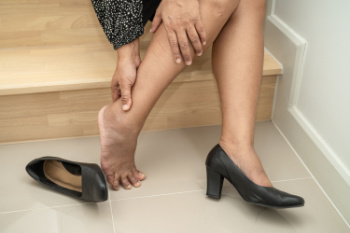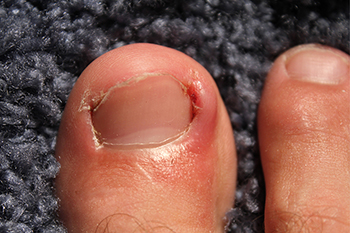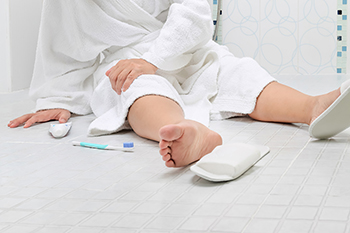
Foot and ankle injuries are common and can affect people of all ages and activity levels. Neuromas involve thickened nerve tissue, often between the toes, leading to burning pain and tingling sensations. Stress fractures are tiny cracks in the bone caused by repetitive impact, often seen in athletes or individuals with increased physical activity. Plantar fasciitis is a condition where the band of tissue along the bottom of the foot becomes inflamed, resulting in sharp heel pain, especially in the morning. Heel spurs are bony growths that may develop in response to long-term plantar fasciitis. Additionally, bunions are painful bumps that form at the base of the big toe due to joint misalignment. Foot pain can develop for various reasons, and may cause difficulty in completing daily activities. If you have foot pain of any type, it is suggested that you consult a podiatrist who can offer an appropriate treatment plan.
Foot Pain
Foot pain can be extremely painful and debilitating. If you have a foot pain, consult with one of our podiatrists from ABC Podiatry. Our doctors will assess your condition and provide you with quality foot and ankle treatment.
Causes
Foot pain is a very broad condition that could be caused by one or more ailments. The most common include:
- Bunions
- Hammertoes
- Plantar Fasciitis
- Bone Spurs
- Corns
- Tarsal Tunnel Syndrome
- Ingrown Toenails
- Arthritis (such as Gout, Rheumatoid, and Osteoarthritis)
- Flat Feet
- Injury (from stress fractures, broken toe, foot, ankle, Achilles tendon ruptures, and sprains)
- And more
Diagnosis
To figure out the cause of foot pain, podiatrists utilize several different methods. This can range from simple visual inspections and sensation tests to X-rays and MRI scans. Prior medical history, family medical history, and any recent physical traumatic events will all be taken into consideration for a proper diagnosis.
Treatment
Treatment depends upon the cause of the foot pain. Whether it is resting, staying off the foot, or having surgery; podiatrists have a number of treatment options available for foot pain.
If you have any questions, please feel free to contact our office located in Columbus, OH . We offer the newest diagnostic and treatment technologies for all your foot care needs.

An ingrown toenail develops when the edge of the nail grows into the skin along the side of the toe, often causing pain, swelling, and sometimes infection. When an ingrown toenail does not improve or worsens, a podiatrist may recommend a medical procedure. One common option is a partial nail avulsion, which involves numbing the toe with a local anesthetic and then removing only the part of the nail that is growing into the skin. This reduces pressure and allows the toe to heal. If ingrown toenails keep coming back on the same toe, a matrixectomy may be performed during the same visit. This procedure removes or destroys the nail root, called the matrix, so that part of the nail will not grow back. This procedure can be done using a chemical, heat from an electric device, or a surgical instrument. If there is an infection, a podiatrist may also prescribe oral antibiotics to kill the bacteria. If you have a problematic ingrown toenail, it is suggested that you schedule an appointment with a podiatrist for an exam, diagnosis, and safe treatment.
Ingrown toenails may initially present themselves as a minor discomfort, but they may progress into an infection in the skin without proper treatment. For more information about ingrown toenails, contact one of our podiatrists of ABC Podiatry. Our doctors can provide the care you need to keep you pain-free and on your feet.
Ingrown Toenails
Ingrown toenails are caused when the corner or side of a toenail grows into the soft flesh surrounding it. They often result in redness, swelling, pain, and in some cases, infection. This condition typically affects the big toe and may recur if it is not treated properly.
Causes
- Improper toenail trimming
- Genetics
- Improper shoe fitting
- Injury from pedicures or nail picking
- Abnormal gait
- Poor hygiene
You are more likely to develop an ingrown toenail if you are obese, have diabetes, arthritis, or have any fungal infection in your nails. Additionally, people who have foot or toe deformities are at a higher risk of developing an ingrown toenail.
Symptoms
Some symptoms of ingrown toenails are redness, swelling, and pain. In rare cases, there may be a yellowish drainage coming from the nail.
Treatment
Ignoring an ingrown toenail can have serious complications. Infections of the nail border can progress to a deeper soft-tissue infection, which can then turn into a bone infection. You should always speak with your podiatrist if you suspect you have an ingrown toenail, especially if you have diabetes or poor circulation.
If you have any questions, please feel free to contact our office located in Columbus, OH . We offer the newest diagnostic and treatment technologies for all your foot care needs.

Falling can cause significant injuries to the feet, including sprains, fractures, and bruising. Impact from a fall may weaken the muscles and joints, leading to instability and discomfort. Strengthening the feet can help prevent falls by improving balance and stability. Using a resistance band to perform foot exercises enhances flexibility and strengthens the muscles that support the arches. Picking up marbles with the toes helps improve dexterity and grip strength, making the feet more responsive to changes in terrain. Regular stretching and strengthening exercises increase foot control, reducing the risk of missteps. Wearing supportive footwear and maintaining strong, flexible feet contribute to better stability. If you have fallen and have sustained a foot or ankle injury, it is suggested that you promptly visit a podiatrist who can treat various foot conditions.
Preventing falls among the elderly is very important. If you are older and have fallen or fear that you are prone to falling, consult with one of our podiatrists from ABC Podiatry. Our doctors will assess your condition and provide you with quality advice and care.
Every 11 seconds, an elderly American is being treated in an emergency room for a fall related injury. Falls are the leading cause of head and hip injuries for those 65 and older. Due to decreases in strength, balance, senses, and lack of awareness, elderly persons are very susceptible to falling. Thankfully, there are a number of things older persons can do to prevent falls.
How to Prevent Falls
Some effective methods that older persons can do to prevent falls include:
- Enrolling in strength and balance exercise program to increase balance and strength
- Periodically having your sight and hearing checked
- Discuss any medications you have with a doctor to see if it increases the risk of falling
- Clearing the house of falling hazards and installing devices like grab bars and railings
- Utilizing a walker or cane
- Wearing shoes that provide good support and cushioning
- Talking to family members about falling and increasing awareness
Falling can be a traumatic and embarrassing experience for elderly persons; this can make them less willing to leave the house, and less willing to talk to someone about their fears of falling. Doing such things, however, will increase the likelihood of tripping or losing one’s balance. Knowing the causes of falling and how to prevent them is the best way to mitigate the risk of serious injury.
If you have any questions, please feel free to contact our office located in Columbus, OH . We offer the newest diagnostic and treatment technologies for all your foot care needs.





